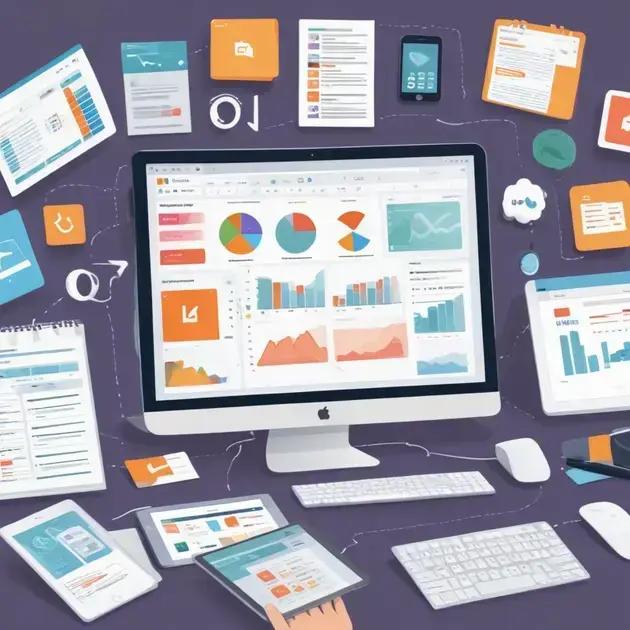The most used software in business includes productivity tools, accounting software, project management solutions, communication platforms, and data analysis tools. Each type plays a crucial role in enhancing efficiency, streamlining processes, and improving decision-making within organizations.
Most used software in business today shapes how organizations operate, enhancing efficiency and driving growth. With countless tools available, it can be overwhelming to determine which ones truly make a difference. From productivity suites to essential financial software, each tool plays a crucial role in aiding day-to-day operations. In this article, we will explore the leading software solutions that businesses rely on, providing insights into their functionalities and how they can transform your operations.
Top Productivity Software for Businesses
Productivity software is crucial for businesses to manage tasks efficiently and improve team collaboration. These tools help streamline processes, allowing employees to focus on their core responsibilities.
Popular Productivity Tools
Some of the most widely used productivity software includes Microsoft Office 365, which offers tools like Word and Excel, and Google Workspace, known for its cloud-based apps. Both platforms provide features for real-time collaboration.
Features That Enhance Productivity
Key features of effective productivity software often include task management, document sharing, and integrated communication channels. Tools like Asana and Trello help teams organize tasks visually and track progress in real time.
Choosing the Right Tool
When selecting productivity software, consider factors like user-friendliness, scalability, and integration capabilities with existing systems. It’s important to involve teams in the decision-making process to ensure the tool meets their needs.
Benefits for Remote Teams
For remote teams, productivity software offers essential benefits such as maintaining clear communication and ensuring everyone is aligned on goals. These tools are important for keeping projects on track, especially when team members are working from different locations.
Key Accounting Tools to Streamline Finances

Managing finances is a critical aspect of running any business. Key accounting tools can streamline your financial processes, making it easier to track income, expenses, and overall financial health.
Essential Features of Accounting Software
Quality accounting software should offer features like invoicing, expense tracking, and financial reporting. Tools like QuickBooks and Xero provide user-friendly interfaces that simplify managing your finances.
Benefits of Using Accounting Tools
Using dedicated accounting software can save time and reduce errors. Automated processes ensure accuracy in financial reporting and help with tax preparation. Additionally, these tools make it easy to collaborate with accountants or financial advisors.
Choosing the Right Accounting Software
Selecting the right tool depends on your business size and specific needs. For small businesses, affordable options like FreshBooks can offer excellent value, while larger enterprises might prefer more comprehensive solutions with advanced features.
Integrating with Other Business Tools
Integration with other business applications is vital. Many accounting tools can connect with payment processors, CRM systems, and e-commerce platforms, enhancing workflow efficiency and data accuracy.
Getting Started with Accounting Software
To begin using accounting software, start by setting up your financial accounts within the tool. Input your company details and begin tracking your finances from day one. Most platforms provide helpful tutorials to guide you through the initial setup.
Best Project Management Software Available
Project management software is vital for keeping teams organized and ensuring projects are completed on time. These tools help in planning, tracking progress, and collaborating effectively.
Top Project Management Tools
Some of the most popular options include Asana, Trello, and Monday.com. Each platform offers unique features to cater to diverse business needs, such as task assignments, deadlines, and progress tracking.
Key Features to Look For
When choosing project management software, seek features such as task management, timelines, and team collaboration options. Interactive dashboards provide a visual overview of project status, while file sharing simplifies communication among team members.
Benefits of Project Management Software
Utilizing project management tools can increase team productivity by keeping everyone aligned on goals and responsibilities. Having a clear structure helps prevent misunderstandings and keeps projects on track.
Choosing the Right Tool for Your Business
Selecting the ideal software depends on your team size and project complexity. Many tools offer free trials, allowing you to explore their functionalities before making a commitment. Consider feedback from team members during the selection process.
Best Practices for Implementation
To effectively implement project management software, start by training your team to ensure everyone is comfortable using the new tool. Establish clear processes for task assignments and updates to maximize its benefits.
Essential Communication Tools for Teams

Effective communication is key for any team’s success. Communication tools facilitate collaboration and information sharing, ensuring that everyone is on the same page.
Top Tools for Team Communication
Some widely used communication tools include Slack, Microsoft Teams, and Zoom. These platforms allow teams to chat, hold video conferences, and share files easily.
Features to Enhance Communication
Look for features such as instant messaging, video calls, and integration with other software. Tools like Trello can also integrate communication channels directly into project boards, keeping discussions linked to specific tasks.
Benefits of Using Communication Tools
Using dedicated communication tools helps reduce email overload and fosters a more collaborative environment. Team members can communicate in real-time, allowing for quicker decision-making and problem-solving.
Choosing the Right Communication Tool
Selecting the right tool depends on your team’s size and needs. Consider factors like user-friendliness, mobile access, and whether the tool allows for both synchronous and asynchronous communication.
Best Practices for Effective Communication
Encourage team members to use communication tools regularly. Establish guidelines for best practices, like setting availability statuses and using specific channels for different types of communication, to enhance teamwork.
Data Analysis Software That Drives Decisions
Data analysis software is essential for businesses to make informed decisions based on accurate information. These tools enable companies to gather, process, and interpret data effectively, guiding strategy and operations.
Top Data Analysis Tools
Popular options include Google Analytics, Tableau, and Microsoft Power BI. Each offers unique features that help organizations visualize data and gain insights into trends and performance.
Key Features of Data Analysis Software
Look for features like real-time data processing, data visualization, and easy report generation. These capabilities help teams quickly understand complex data and present findings effectively.
Benefits of Analyzing Data
Using data analysis software can significantly enhance decision-making by providing factual evidence to guide strategies. Organizations that utilize data-driven insights can better anticipate market changes and customer needs.
Choosing the Right Software for Your Business
When selecting data analysis software, consider the specific requirements of your business and the type of data you will analyze. Ensure the tool can integrate with your existing data systems for seamless operation.
Getting Started with Data Analysis
To start with data analysis, first, identify key performance indicators (KPIs) relevant to your business goals. Then, set up the data analysis tool to collect, analyze, and visualize this data, enabling informed decision-making.
In Summary: Harnessing the Best Software for Your Business
Utilizing the right software tools can greatly improve your business operations. From productivity software that keeps teams organized to accounting tools that simplify finances, each option offers unique benefits.
Communication tools enhance collaboration, while project management software ensures that tasks are completed efficiently. Additionally, data analysis software drives informed decision-making by providing valuable insights.
By carefully selecting the best software to meet your specific needs, your business can operate more smoothly and effectively, paving the way for growth and success.
FAQ – Frequently Asked Questions About Business Software
What are the key benefits of using productivity software in my business?
Productivity software helps streamline tasks, improve organization, and enhance team collaboration, leading to increased efficiency and time savings.
How can accounting tools simplify financial management?
Accounting tools automate financial processes, making it easier to track income and expenses, generate reports, and manage taxes efficiently.
What communication tools are best for remote teams?
Popular options for remote teams include Slack, Microsoft Teams, and Zoom, which facilitate real-time communication and collaboration.
Why is data analysis important for business decisions?
Data analysis provides valuable insights that help businesses make informed decisions, anticipate trends, and improve overall performance.
How do I choose the right project management software for my team?
Consider your team’s size, project complexity, and desired features when selecting project management software. Free trials can help you evaluate which tool works best.
What should I look for in data analysis software?
Look for features like real-time data processing, visualization tools, and easy report generation to ensure the software meets your analysis needs.




